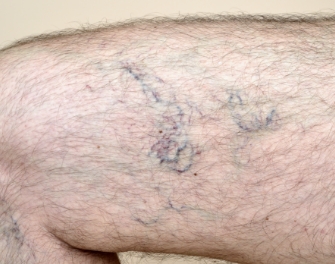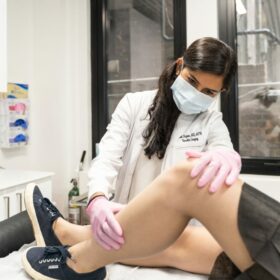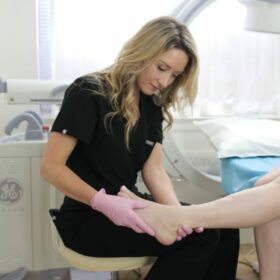What is a vein surgeon called?
A vein surgeon is a medical professional who specializes in vein diseases and other related issues. They are typically referred to as a phlebologist, which comes from the Greek word phlebos, meaning vein. This type of surgeon is usually specially trained to diagnose, treat, and prevent spider veins, varicose veins, blood clots, and other vein-related issues.
Vein surgeons provide a range of treatments for venous diseases. They may recommend lifestyle changes to improve circulation or provide minimally invasive procedures, such as sclerotherapy or radiofrequency ablation. Sclerotherapy involves injecting a sclerosant into the damaged vein to close it off, whereas radiofrequency ablation involves using thermal energy to destroy the diseased saphenous vein responsible for your vein problems.
Vein surgeons also diagnose and treat leg ulcerations, venous ulcers, and deep vein thrombosis. They can assist patients with venous stasis, a condition where blood does not flow properly through the veins and instead pools in the lower legs and feet. Vein surgeons can have different titles, depending on their specialization and practice, such as vein doctors, vein specialists, vein experts, and vascular surgeons. They can come from all fields of medicine, provided they have specialized training in vein treatments.
When choosing a vein surgeon, patients must ensure that the doctor is adequately qualified and experienced in providing the necessary treatment. It is also advisable to check whether the doctor is board-certified by the American Board of Venous and Lymphatic Medicine, which certifies the best vein doctors. Last but not least, it is essential to ensure that the doctor has a good track record of success and is committed to providing the highest quality care.
Vein Treatment Clinic is led by board-certified vein doctors who meet all of the requirements mentioned above. Our vein doctors stay abreast of the latest developments in vein care and offer minimally invasive procedures to identify and treat the root cause of chronic venous insufficiency. You can find our vein doctors in New York City, Long Island, New Jersey, California, and Maryland. Please schedule an appointment to explore your vein treatment options at your nearest vein clinic.
When to contact a doctor to remove varicose veins?
If you’re dealing with an unsightly appearance, itching, or aching caused by varicose veins, it might be time to contact a doctor. Varicose veins – or twisted and swollen veins that protrude from the skin’s surface – are common conditions that can cause a range of uncomfortable symptoms. The good news is that modern treatments for the condition are minimally invasive, safe, effective, and often covered by insurance. Furthermore, they’re performed as in-office procedures that conclude within an hour and don’t involve downtime.
If you’re noticing swollen and bulging veins, aching or itching in your legs, or any type of discoloration – it might be time to call a vein doctor. The vein doctor may recommend an initial visit to diagnose the condition. During this time, they will likely perform a duplex ultrasound to better understand your condition. This will allow them to determine the best treatment plan for your varicose veins.
Although some varicose veins may not cause any symptoms, it’s important to stay on top of your condition. In some cases, the veins can weaken blood vessels and lead to more serious problems, such as deep vein thrombosis or blood clots. If your varicose veins are causing pain, you must contact a vein doctor without delay. Varicose vein treatments, such as sclerotherapy, endovenous laser ablation, and radiofrequency ablation, can reduce the appearance of the veins, eliminate any discomfort, and address the underlying root cause.
What does a vein specialist do?
A vein specialist is a medical professional who focuses on diagnosing and treating issues related to veins, such as varicose veins, spider veins, blood clots, and other vein-related problems. The expertise of a vein specialist helps ensure that all vein-related issues are properly identified and treated promptly to maintain and improve overall health.
A vein specialist first assesses a patient’s individual situation and, depending on the patient’s symptoms, may order additional tests, such as a duplex ultrasound, which helps the specialist get a better picture of the underlying issues. Once all necessary diagnoses are made, the specialist can begin specific treatment for the particular vein-related issues. Treatments could include sclerosant injections and minimally invasive procedures, such as endovenous laser treatment (EVLT) or radiofrequency ablation.
Vein specialists also use compression stockings to help improve blood circulation and aid in the healing process. Compression stockings come in various materials, sizes, and styles, allowing the specialist to tailor the solution to the patient’s needs. In addition to treating vein-related issues, a vein specialist can advise and educate a patient, including information on lifestyle factors that can improve or worsen existing vein or circulation problems, such as exercise, diet, and smoking.
What happens if vein disease is left untreated?
If vein disease is left untreated, you could experience worsening symptoms and potentially more serious consequences. Varicose veins may become swollen and inflamed, causing pain and increasing your risk of developing skin ulcers, infections, and blood clots. Over time, if left untreated, varicose veins may permanently damage the veins and, in some cases, even lead to more serious complications. It is important to seek medical advice if you are experiencing any of the symptoms associated with vein disease so that they can be treated promptly and effectively.











